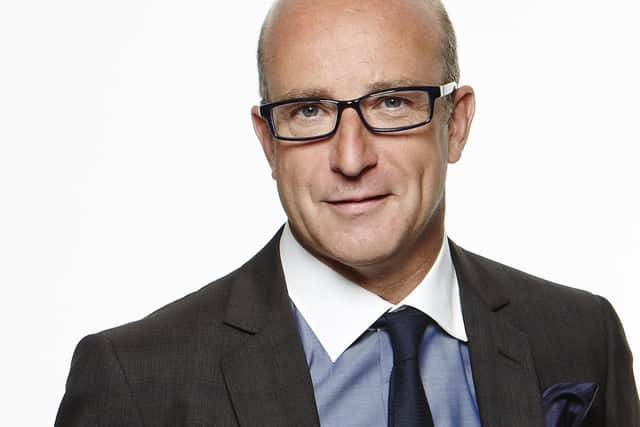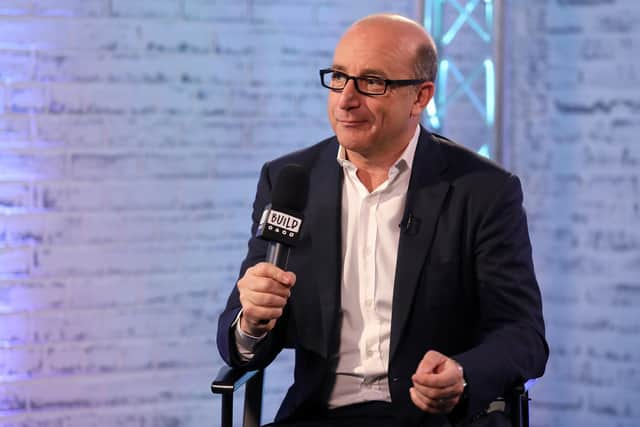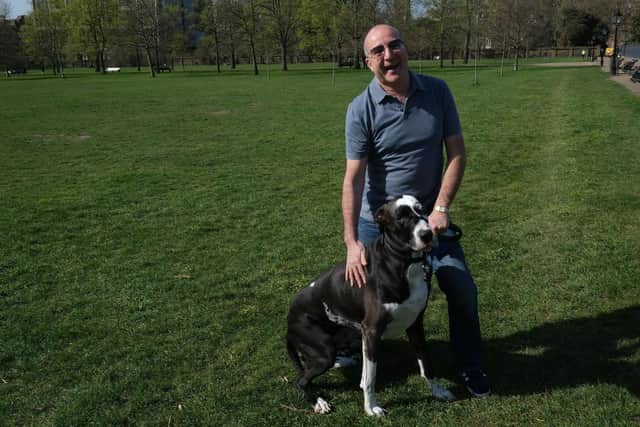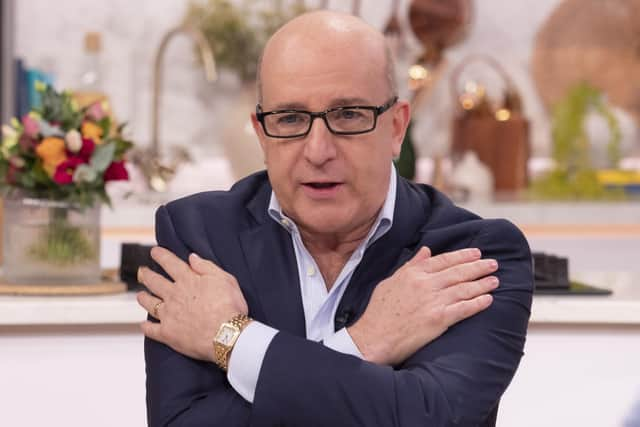Hypnotherapist Paul McKenna tells Janet Christie about bringing his Instant Confidence show to Scotland
Interviewing hypnotherapist, behavioural scientist and broadcaster Paul McKenna is an upbeat experience. First there’s the voice - a honey being pouring over gravel, waves hitting a pebbly beach kind of sound, deep and soothing, as if he already knows about your hang ups and can help you. He has me at Hell-lo Janet.
Then there’s his subject - how our brains work - and his mission to use that knowledge to give us tools to help ourselves.
Advertisement
Hide AdAdvertisement
Hide AdAnd thirdly there’s the fact that he’s a born entertainer who likes people. Witness a 30-year career spent helping more than 10 million improve their lives through bestselling books, performances, podcasts and public and private therapy. He even enjoys talking to journalists.


“I don’t mind the media. It’s lovely talking to you; you’re asking me questions nobody else has and I get to talk about what I do,” he says in a video call from his London office with its deep leather-upholstered armchair for clients and a phrenology head perched on a shelf behind him. “Someone gave me that because people think it’s associated with hypnotism, which it isn’t, but I thought it looked neat, so I put it there.”
Following the success of his live Positivity shows in 2022, McKenna is back touring the UK and Ireland with his new coaching event: Instant Confidence where over a highly interactive 90 minutes he will demonstrate transformational techniques for hundreds of people to help them become more motivated, determined and confident and to switch off fear and anxiety. Who wouldn’t want that?
For those who can’t make it to Edinburgh or his other venues, don’t stress, he has a whole shelf full of selfhelp titles - particularly his latest Freedom From Anxiety, published this January, to help with that, as well as a whole host of other issues from comfort eating to healing your broken heart. So many titles in fact that he can’t come up with a tally.
“Do you know I’ve lost count. It’s in the twenties I think. That’s terrible. I don’t know how many I’ve written. I’ve never stopped to count. I write one and I’m proud of it and then I let it go, you know.“


Right now the issue that’s big for Mckenna is anxiety and he’s on a mission to calm us down using the latest step-by-step psychological techniques to help people train their mind and body.
“Anxiety is HUGE! We’re in a psychological pandemic and people have gotten good at becoming anxious, with the news telling people we’re under attack: the virus, war, the economy, so people have been rehearsing over and over the catastrophes - we’re all going to die, we’re doomed. In the same way that confidence is a habit, so is anxiety.
Advertisement
Hide AdAdvertisement
Hide Ad“There are ways now to treat it really fast and effectively, certainly to improve quality of lives. If the bandwidth of your thinking is entirely taken up with survival thoughts, you’re going to be fatigued, start making bad decisions and weaken your immune system. You need to reduce that and then you’ve got room for the good stuff: the optimism, the joy, the creativity.”
So at his Instant Confidence event, will he be hypnotising the audience and what techniques will he use?


“Absolutely,” he says. “Basically it’s a 90-minute coaching event, so it’s not a lecture. It’s like what I would do if we were sat here [he indicates the comfy leather chair], it’s just there’s hundreds of people present. So I’ll say ‘who’s frightened of public speaking’, loads of hands go up, I’ll invite someone to join me and then minutes later they are focused, strong, authentic, and can talk to the audience like they’re talking to friends. Then I say ‘shall we all try that? Think of something that overwhelms and frightens you, boom let’s knock it flat and let’s very quickly get confidence.’
“So I do a load of techniques like this - stopping self-sabotage, getting motivated, designing a good future - because really confidence is a habit, just as anxiety is. What you practise you get good at. The idea is that by the end of the event you feel fantastic, particularly after the mass hypnosis, you leave on a high, but you’ve got a handful of practical techniques you can take home to use whenever you want. That’s why it’s instant confidence. Whenever you’ve learned it you can turn it on instantly and get into a resourceful, resilient place. I’m also explaining it a bit and I’ve got a sense of humour so it’s not all serious but it’s a very pragmatic approach to being able to get more of what you want.”
McKenna is keen to stress how advances in knowledge about how the brain works have influenced modern psychology over the last 20-30 years and that self-help techniques have changed dramatically.
“Old-fashioned therapy, analysis, where you sit and tell someone over and over about the bad stuff - you get it off your chest and sometimes there may be a value in an understanding, a revelation, a post-rationalisation about something traumatic - but the problem is you can reinforce it. Now we have modern techniques like NLP, and in the last 20 years hypnosis has finally been accepted into science and medicine and psychology. Then there are the psychosensory techniques like tapping, Havening, which is the new one on the block, that’s testing off the scale.”


At this my ears prick up because after reading McKenna’s latest book I was Havening - stroking my brow and arms - while waiting for him to appear on the screen in a bid to quell my customary fear of technological failure, and I have indeed forgotten to stress about it while we’re talking. But what about more complex issues, has McKenna ever been faced with a problem he couldn’t solve?
Advertisement
Hide AdAdvertisement
Hide Ad“Well in the last 25 years I can count on one hand people I’ve not been able to cure. And some of those were extraordinary situations. It depends what you class as cured as well. There was a guy who came to see me who had insomnia so I did a session and he came back two weeks later and said you’ve not cured me. I said how much better is it and he said about 80%. I said listen to yourself. He saw it as not working and glass half empty.”
As to which issues are the most difficult, McKenna hones in on depression, eating disorders, OCD and his latest preoccupation, anxiety.
“I’ve worked with a tonne of anxious people sitting here,” he says. “Some of them don’t want to let go of their anxiety because they’re used to it and it gives them their edge and they think if they relax the world will stop turning.
“And occasionally there’s a really bizarre disorder that takes a long time. One of the strangest, but very gratifying, was a man who had hysterical blindness. He’d been hit on the head on a construction site and been blind for six years. It’s very rare - Adolf Hitler had it and somebody cured him unfortunately - and basically a PTSD issue. After a year this man slowly began seeing more then one day he suddenly could begin to see his wife’s face. It was extraordinary. Because the brain is plastic it began to make repairs in neural networks. So that’s a really difficult thing to do and often it’s two steps forward and one step back so you’ve got to have massive determination, flexibility and to think sometimes outside your normal parameters. It’s like trying to solve a Rubik’s cube that fights back.”
Among well known names that have credited McKenna with helping their confidence are Roger Daltrey, Russell Brand, Daryl Hannah, Sophie Ellis-Bextor and James Corden, none of them people who would at first glance appear to have a deficit. Is he surprised by some of the people who get in touch?
“Oh sure. I work with people pretty much every week and never charge because this is my way of giving something back - I mean I charge for say a corporate event and I’m very expensive but otherwise, I’ve never charged. And I’ve been at the sharp end for about the last ten years with war veterans, rape victims, bereavement cases, or people everyone else has given up on. But if some big movie or rock star gets in touch and I want to meet them, I have a shallowness and go ‘come on over mate’.
“Some of them are not unconfident but want to be more confident, in the zone, even more amazing. That’s not uncommon, particularly amongst athletes who want that thing that gives them the edge because the difference between a medal and an also ran is about one percent and you can make that up with focus. It doesn’t matter how rich or famous, people have the same problems; they’re phobic or want to give something up or have some habit, or something very unusual that your average therapist would not know how to treat.”
Advertisement
Hide AdAdvertisement
Hide AdNow 59, McKenna’s been treating people for three decades and been very successful, not least financially, so no one would blame him if he sat back in his comfy chair and relaxed, went on extended holidays with his former PA and now wife of six years Kate, or played golf every day. Why doesn’t he?
“Good point,” he says. Friends of mine say ‘you’re never going to retire are you’ but I’m actually taking it slower than when I used to attack the day and sometimes burn out. I’m one of those people that needs to do things. I love my job. LOVE it! It has variety, whether it’s writing a book, touring and putting on what is essentially a performance, but also an education, or solving someone’s problem that no one else has been able to or inventing some new psychological device I can share. I think if I did retire I’d probably go a little crazy. And do you know what I noticed when I wasn’t doing anything? I put on some weight during Covid.”
Surely not, the man who wrote Freedom From Emotional Eating and I Can Make You Slim?
“Exactly,” he laughs. “So I did some processes on myself and it’s coming off now. I was going to the fridge when I was bored, or anxious, so I put a big question mark on it in the end to stop myself doing it. I say show me a perfect therapist who doesn’t smoke, or drink or put on a bit weight. If you’re looking for that, you’re looking for a guru not a therapist.”
“There was an osteopath who used to treat me and he had a hunch back himself, but it didn't matter because he was brilliant. I’m as human as anybody else and of course I have problems and challenges - that’s how you learn and grow. You’ve got to ask yourself: ‘does your life work?’. And my life does. I’m really happy.”
He wasn’t always. There was a time when he lacked confidence, was broken hearted, engaged in behaviours that could be described as self-destructive. If he could go back and speak to his younger self, what would he say and which technique would he use?
“I’ve used my technique where you imagine a TV screen and see you at a time when you were struggling, sad, abandoned, hopeless, whatever, float into the screen and you stop the world and explain to the younger you that you’re from the future and even though this is a challenging time, you survive it and are going to be OK. Then you put the younger you into your heart and let your heart heal the younger you. There’s a little bit more to that process, but that’s the gist of it,” he says.
Advertisement
Hide AdAdvertisement
Hide Ad“And I would teach myself the hypnosis and communication skills, confidence enhancing, self-esteem and all the learning I didn’t know when I was younger. But then I would have a different history because a lot of the things that happened that I wouldn’t have signed up for were an opportunity to learn and grow. It didn’t feel like it at the time I can tell you, but I can go, bad as that was, this and this came out of it. Getting my heart broken led me to try and find out how it was that happened and how it could be overcome.”
And this being Paul McKenna, that led to a book.
“Yeah, I Can Mend Your Broken Heart. The trance that comes with it is fantastic. At one point that book had the highest number of positive reviews of anything I’ve written. People would say I was suicidal, I just didn’t know how to go on and I read this daft book and listened to the hypnosis and sure I miss him or her but I can function now and it’s all good, it’s going to be OK. It’s an astounding amount of people that had this 180 degree turnaround in their life as a result of a devastating heartbreak.”
Along with changes in neuroscience and psychology McKenna’s live shows are now light years away from those he performed back in the 1990s.
“The shows were comedy shows and I stopped doing that more than 20 years ago,” he says. “Put a volunteer in a trance and they think they’re a ballerina or a kangaroo, a shy banker suddenly strutting around like Mick Jagger, it’s kindly making fun of people. Then it became all about therapy and change and motivation and so I get hired to do a lot of motivational talks. Sometimes they want half an hour, 90 minutes, or a day and it can be very specific - persuasion, influence, confidence, or can you come in and teach hypnosis? So I decided to compress it all into 90 minutes so it has the feeling of a show, an event, and it’s got an atmosphere, an electricity about it. Its not ‘and another healing!’. It’s not as hokey as that, it’s scientifically-based what I’m doing, but at the same time I can’t help but give it a bit of flair because I’m an entertainer, or I was in my previous life, so you’ve got a marriage of these two things.”
“So what I’ve done is borrow a little bit of entertainment. A lot of the people that do the same sort of thing teach it like a lecturer. Some of my colleagues are very hard core academics, so when I’m doing a Havening training, I’m the entertainment, and the rest of it is ‘let’s talk about the electroceutical effects of Havening touch in relation to the serotonin, the dopamine’, you know it’s hard science. It’s not even psychology, it’s hard science, it’s neuropharmacology and its relationship to touch, and in the context of healing.
“So this is, if you like, a pop psychology show, but it’s not a talk, it’s an experience. That’s why I call it a coaching event, not therapy, and also the fixes I’m doing are in minutes. We’re not doing a full 90 minutes to two hours like we would at a conference where you take somebody who has suffered a severe trauma and pull that apart, explaining what you’re doing. This is ‘hello ladies and gentlemen! Let’s make you feel good!’
Paul McKenna will be bringing his new UK & Ireland live tour ‘Instant Confidence’ to Edinburgh Central Church on Thursday 9 March – tickets and tour information are available at mindbodyspirit.co.uk. Paul’s bestselling new book ‘Freedom From Anxiety’ is out now, published by Welbeck